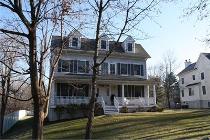Just as we’re starting to get used to sultry summer, there’s a change in weather. Days are suddenly shorter, night temperatures drop and woodland creatures scurry about with great purpose. These are all signals that fall days are upon us, harbingers of harsh winter months. Spring may feel very far away but there is much that you can do NOW that will prepare your home’s surroundings for then.
Croton on Hudson landscape designer Karen Jescavage Bernard makes the following suggestions for preparing your yard to weather winter storms and emerge alive and thriving in the spring.
Neatness counts! Trim dead and broken plants and branches, border the edges of lawns and continue to weed. A thought or two about mulching – hold off mulching to protect fragile plants until the ground is really cold, around 40 degrees, probably about mid-November in Westchester and Putnam Counties. The ground takes a while to cool down after hot summer days. Grass clippings from a mulching mower can stay on the lawn without difficulty but avoid chopping leaves and twigs and leaving them behind. The decomposition process of these actually pulls nitrogen from the soil and will damage your lawn. However, those materials chopped in your mulching mower can be used at the base of trees.
Throughout the spring and summer you’ve been careful to not cut your lawn too close to the ground, right? Fall is the ideal time to prepare your lawn for the next growing season − to aerate the grass, reseed thinned spots and spread fertilizer or compost into the soil. Water well if there’s a dry stretch, though fall is typically pretty wet in the northeast.
Pruning is best done in the late winter while trees and shrubs are dormant, before they start to leaf out, so stay away from it in the fall while growth is still taking place. Fall pruning should only be for damaged or broken branches. Cuts should be clean, though sealing the “wound’ is no longer recommended.
Ms. Jescavage Bernard also suggests that we avoid using bone meal as a fertilizer for bulbs. Raccoons love to dig it up looking for the real thing and the material is now so processed as to have little nutritive value to the plants.
It’s probably wise to think of how wildlife affects on your property over the winter. Young saplings are particularly vulnerable to deer. Because of its stickiness, Liquid Fence is an aromatic product that is rather long lasting, effective in warding off these predatory herbivores that can quickly destroy almost any garden in a few short hours. You’ll want to spray at least three times – late October/early November, late December and late winter. Deer are not the only destructive invaders; insects are as well. The emerald ash borer has been reported near West Point and has lead to an injunction against moving firewood from county to county in New York State. Be sure to report any that you might see attacking your trees. (Check out Wikipedia for an identifying image of the Emerald Ash Borer.)
A backyard devoid of all wildlife is NOT desirable, however. You can encourage habitats for all kinds of creatures, birds in particular. Late fall and winter are great times to help sustain both and migratory birds by setting out feeders far enough from your house so that they feel secure in using them. Check out The National Wild Life Federation’s website ( www.nwf.org) for more information about creating wildlife habitats on your property.
Finally, if you’re thinking of selling, you’re going to want your property to look its very best even in winter. You might consider hiring a landscape designer now to help give a boost to your home’s winter curb appeal.



